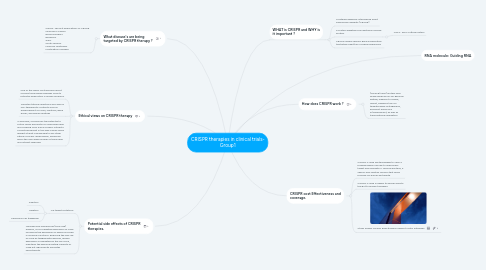CRISPR therapies in clinical trials- Group1
por Oscar Perez


1. What disease's are being targeted by CRISPR therapy ?
1.1. Cancer. The first applications of CRISPR could be in cancer. Blood disorders. Blindness. AIDS. Cystic fibrosis. Muscular dystrophy. Huntington's disease.
2. Ethical views on CRISPR therapy
2.1. One of the major controversies about CRISPR technology emerges from its potential application in human embryos.
2.2. Important ethical questions also arise in non-therapeutic contexts such as enhancement of crops, livestock, gene drives, and human features
2.3. In principle, CRISPR has the potential to fortify foods efficiently for individuals who are suffering from a lack of basic nutrients. Promoting benefit in this way carries moral weight at least comparable to any other ethical concern raised herein, especially given the very large number of those who are nutrient-deprived
3. Potential side effects of CRISPR therapies.
3.1. Off target mutations
3.1.1. Insertion
3.1.2. Deletion
3.1.3. Cancerous cell triggering
3.2. Through RNA sequencing (RNA-seq) analysis, virus-mediated expression of Cas9 influences the expression of genes involved in neuronal functions. Reducing the half-life of Cas9 by tagging with geminin, whose expression is regulated by the cell cycle, maintains the genome editing capacity of Cas9 but significantly alleviates neurotoxicity.
4. RNA molecule: Guiding RNA
5. WHAT is CRISPR and WHY is it important ?
5.1. Clustered Regularly Interspaced Short Palindromic Repeats (CRISPR)
5.2. A protein adapted from Bacterial immune system.
5.2.1. Cas 9 : DNA Cutting Protein
